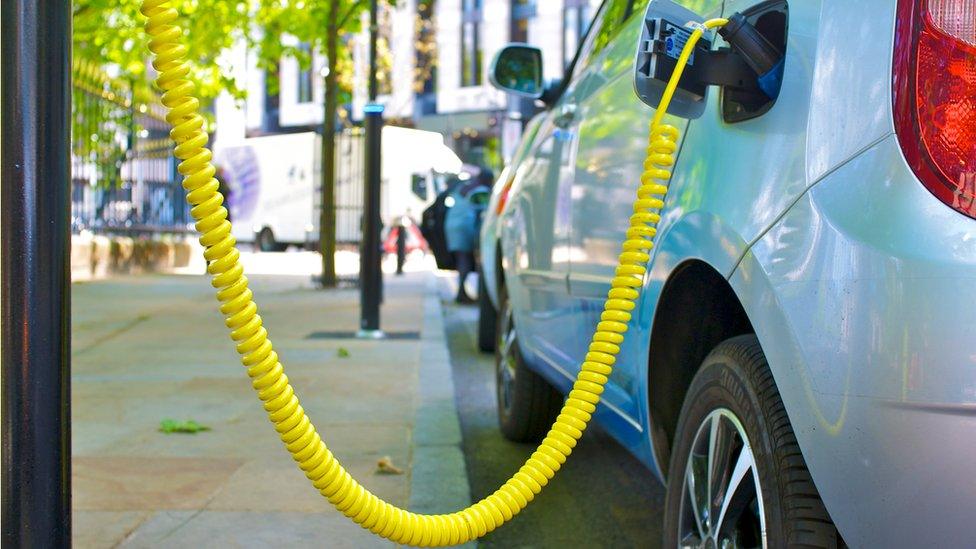Why a petrol and diesel car ban could matter to you
- Published
- comments

When you're old enough to drive, your first car could be electric, thanks to a plan to tackle climate change.
The government has announced that new petrol and diesel cars will be banned from sale in 10 years time, after the year 2030.
Originally set for 2040, the ban on diesel and petrol cars has been brought forward as part of Boris Johnson's 10-point plan to tackle climate change.
The plan also includes protecting green spaces and producing power in different ways.
Petrol and diesel are fossil fuels which are harmful to the environment because, when used, they give off carbon dioxide (CO2).
Carbon dioxide creates an invisible layer in the air that stops heat from escaping and warms the Earth. This is known as global warming or the greenhouse effect.
The prime minister said: "Our green industrial revolution will be powered by the wind turbines of Scotland and the North East, propelled by the electric vehicles made in the Midlands and advanced by the latest technologies developed in Wales, so we can look ahead to a more prosperous, greener future."
But some environmental campaigners are saying these plans are not enough, and that bolder, faster action needs to be taken to make an impact on climate change.
Green activists signed a letter last week, saying: "The climate crisis is here now. No matter how quickly we reach zero emissions, the terrible impacts of the climate crisis will not just go away… As such, no matter how quickly it is done, solely cutting emissions is not enough."
The opposition Labour party has also said the announcement doesn't go far enough for what is needed.
However, the independent Committee on Climate Change, which advises the government, says it's a step in the right direction.
Chris Stark, chief executive of the Committee on Climate Change, said the prime minister's plan was "a bold statement of ambition" but added concerns about making the plans happen:
"What's missing is the road map to achieving it," he said.
Meet the kids racing electric cars (2018)
Last year, there were 2.3 million new cars registered in Britain, but only 37,850 were electric, which is just 1.6%.
Today, fewer than 1% of all cars on UK roads are powered by electricity only.
Under the new rules, cars that use a combination of battery power and fuel - known as hybrids - will be allowed to be sold new until 2035.
Electric only cars don't use fuel, so can't use petrol stations like other vehicles. Instead electric car owners rely on 20,197 charge points around the country.
£1.3bn will be invested in electric vehicle charging points as part of the plan
Nicholas Lyes, from car breakdown company The RAC said many drivers found electric cars "daunting" as they are worried about there not being enough charge points and how long the power in the car will last on journeys.
"Some of these problems will disappear as the average range of electric vehicles increases," he said.
"It's vital that the government continues to invest in developing a fast, reliable and widely available network of chargers that support electric vehicle owners no matter what their circumstances or travel plans."
The government intends to spend over £2bn on the plan, including £1.3bn on charge points for electric vehicles in homes, streets and on motorways across England.
UK car makers have warned the government about the difficulty of making everything ready in time for electric cars in ten years and warned that Brexit could cause problems if it significantly raises costs of making vehicles.
- Published17 November 2020
- Published23 November 2018
